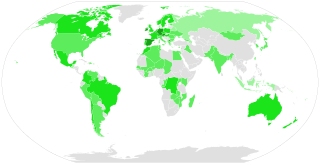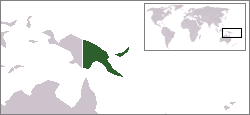Related Research Articles

Papua New Guinea, officially the Independent State of Papua New Guinea, is a country in Oceania that comprises the eastern half of the island of New Guinea and its offshore islands in Melanesia. Its capital, located along its southeastern coast, is Port Moresby. The country is the world's third largest island country with an area of 462,840 km2 (178,700 sq mi).

A green party is a formally organized political party based on the principles of green politics, such as social justice, environmentalism and nonviolence.
Green politics, or ecopolitics, is a political ideology that aims to foster an ecologically sustainable society often, but not always, rooted in environmentalism, nonviolence, social justice and grassroots democracy. It began taking shape in the western world in the 1970s; since then Green parties have developed and established themselves in many countries around the globe and have achieved some electoral success.

Land use planning is the process of regulating the use of land by a central authority. Usually, this is done to promote more desirable social and environmental outcomes as well as a more efficient use of resources. More specifically, the goals of modern land use planning often include environmental conservation, restraint of urban sprawl, minimization of transport costs, prevention of land use conflicts, and a reduction in exposure to pollutants. In the pursuit of these goals, planners assume that regulating the use of land will change the patterns of human behavior, and that these changes are beneficial. The first assumption, that regulating land use changes the patterns of human behavior is widely accepted. However, the second assumption - that these changes are beneficial - is contested, and depends on the location and regulations being discussed.

The Greens is a political party in Poland.
Global governance refers to institutions that coordinate the behavior of transnational actors, facilitate cooperation, resolve disputes, and alleviate collective action problems. Global governance broadly entails making, monitoring, and enforcing rules. Within global governance, a variety of types of actors – not just states – exercise power. Governance is thus broader than government.
Public participation, also known as citizen participation or patient and public involvement, is the inclusion of the public in the activities of any organization or project. Public participation is similar to but more inclusive than stakeholder engagement.
The Estonian Greens is a green political party in Estonia. Founded in 2006, the party held six seats in the Riigikogu from 2007 to 2011. Its objective is to ensure that Estonia's development is environmentally friendly, sustainable, politically stable and economically efficient.

Papua New Guinea together with the West Papua region of Indonesia make up a major tropical wilderness area that still contains 5% of the original and untouched tropical high-biodiversity terrestrial ecosystems. PNG in itself contains over 5% of the world's biodiversity in less than 1% of the world's total land area. The flora of New Guinea is unique because it has two sources of origin; the Gondwana flora from the south and flora with Asian origin from the west. As a result, New Guinea shares major family and genera with Australia and the East Asia, but is rich in local endemic species. The endemicity is a result of mountainous isolation, topographic and soil habitat heterogeneity, high forest disturbance rates and abundant aseasonal rainfall year round. PNG boasts some 15–21,000 higher plants, 3,000 species of orchids, 800 species of coral, 600 species of fish, 250 species of mammals and 760 species of birds and 8 species of tree-kangaroos out of which 84 genera of animals are endemic. Ecosystems range from lowland forests to montane forests, alpine flora down to coastal areas which contains some of the most extensive pristine mangrove areas in the world. Much of this biodiversity has remained intact for thousands of years because the ruggedness of the terrain made the interior lands inaccessible; furthermore low population density and restrictions on the effectiveness of traditional tools, ensured that these biodiversity was never overexploited.

The Ecologist Green Party, formerly known as the Ecologist Party of Moldova "Green Alliance" is a green political party in Moldova.

The United Nations Department of Economic and Social Affairs is part of the United Nations Secretariat and is responsible for the follow-up to major United Nations Summits and Conferences, as well as services to the United Nations Economic and Social Council and the Second and Third Committees of the United Nations General Assembly. UN DESA assists countries around the world in agenda-setting and decision-making with the goal of meeting their economic, social and environmental challenges. It supports international cooperation to promote sustainable development for all, having as a foundation the 2030 Agenda for Sustainable Development and the 17 Sustainable Development Goals (SDGs) as adopted by the UN General Assembly on 25 September 2015. In providing a broad range of analytical products, policy advice, and technical assistance, UN DESA effectively translates global commitments in the economic, social and environmental spheres into national policies and actions and continues to play a key role in monitoring progress towards internationally agreed-upon development goals. It is also a member of the United Nations Development Group.
There are several social issues in Armenia including poverty, high unemployment rates, corruption, and inadequate public services.
A sustainability organization is (1) an organized group of people that aims to advance sustainability and/or (2) those actions of organizing something sustainably. Unlike many business organizations, sustainability organizations are not limited to implementing sustainability strategies which provide them with economic and cultural benefits attained through environmental responsibility. For sustainability organizations, sustainability can also be an end in itself without further justifications.

Deforestation in Papua New Guinea has been extensive and in recent decades from 2001 to 2020, Papua New Guinea lost 1.57Mha of tree cover, equivalent to a 3.7% decrease in tree cover since 2000, and 1.15Gt of CO₂e emissions.
Papua New Guinea (PNG) is a constitutional parliamentary democracy with an estimated population of 6,187,591. Police brutality, provincial power struggles, violence against women, and government corruption all contribute to the low awareness of basic human rights in the country.
Kenya National Congress (KNC) is a Kenyan political party founded in 1991 during the early days of the return of Multiparty Democracy as a result of a split in FORD-Asili. It has consistently fielded candidates in general elections since 1992 at Parliamentary and Local Authority levels. The party sponsored Gatanga Member of Parliament Peter Kenneth, who launched his presidential bid on the party ticket, as well as an alliance between him and Raphael Tuju of the Party of Action The stated vision of KNC, as according to its official web site, is to see Kenya as a proud and prosperous nation that takes care of all her citizens and where hope and self-confidence thrives among all Kenyans both at home and abroad.

The Development Policy Centre (Devpol) is an aid and development policy think tank based at the Crawford School of Public Policy in the College of Asia and the Pacific at The Australian National University. Devpol undertakes independent research and promotes practical initiatives to improve the effectiveness of Australian aid, to support the development of Papua New Guinea and the Pacific Islands region, and to contribute to better global development policy.
Women's rights in Papua New Guinea are severely restricted due to poverty, violence, limited access to education and health care, and patriarchal cultural practices, especially witch hunts. Cases of violence against women in PNG are under reported, due mainly to gender-based violence being socially legitimized. There is also a lack of services for women who experience violence. There are reports of sexual abuse by police officers, on arrest and whilst in police custody. These incidents lack documentation or investigation, consequently, perpetrators are rarely prosecuted or punished. The government of Papua New Guinea (PNG) has introduced legislation to combat these issues, though with limited success.

Papua New Guinea (PNG) is officially known as the Independent State of Papua New Guinea after gaining absolute independence from Australia on September 16, 1975. PNG is the largest country in the South Pacific region and comprises the eastern side of New Guinea including its islands. Crime in Papua New Guinea, both violent and non-violent have contributed to the developing country's crime rate being one of the highest in the world.
References
- 1 2 3 "REGISTRY OF POLITICAL PARTIES" (PDF). Integrity of Political Parties and Candidates Commission. Archived from the original (PDF) on 11 April 2017. Retrieved 11 April 2017.
- ↑ "PNG Greens begin 2012 election campaign", Radio Australia, 15 February 2012
- ↑ "Australian Senators Campaign with PNG Greens", Global Greens, 2 July 2012
- ↑ Constitution of the Papua New Guinea Greens Party
- ↑ "PNG at crossroads as elections loom, says Greens leader", Radio New Zealand International
- ↑ "‘Vibrant’ Belden Namah Victorious in Vanimo-Green", The Garamut, 21 July 2012
- 1 2 3 "Mission | PNG Greens Party". pnggreensparty.org.pg. Retrieved 2016-08-30.
- ↑ "UN Millennium Project | About the MDGs". www.unmillenniumproject.org. Retrieved 2016-08-30.
- 1 2 Papua New Guinea Greens Party (2016). "Constitution of the Papua New Guinea Greens" (PDF). Greens Party Papua New Guinea. Papua New Guinea Greens Party. Retrieved 2016-08-29.
- ↑ "Aussie female senators visit to support PNG Greens - The National". 2012-06-11. Retrieved 2016-08-31.